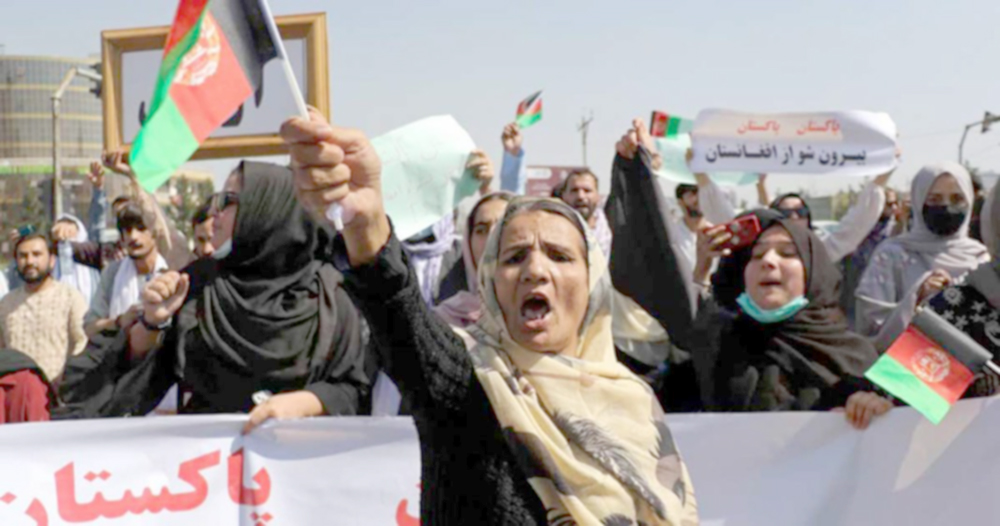When Taliban came to power in 1996, the opposition Northern Alliance immediately proclaimed they had the backing of Pakistan. The world beyond Afghanistan accepted this connection. But Musharraf’s dramatic U-turn came as a shock to Taliban
By Rustam Shah Mohmand
Pakistan, in its relations with Afghanistan, has always carried the baggage of mistrust and deep suspicions bordering on hostility. It is a pity that the factors that have caused such hostility have either not been understood or overlooked by those in power in Islamabad. This absence or lack of understanding of the causes for Afghan distrust has led to several breakdowns of relations in the past. The sad state of affairs continues to this day.
When confronted with Afghan acrimony and anger, Pakistani rulers and the elite appear perplexed. They begin to count the number of favors Pakistan has been extending to its western neighbor. These include support for ‘resistance groups’ battling against Soviet Union’s occupation of Afghanistan, the hosting of a large number of refugees for nearly four decades, contributing to Afghanistan’s reconstruction by investing in a number of sectors and so on. Why then, they ask, should there be any anger against Pakistan?
The doctrine of strategic depth
The answer lies in misplaced hubris, doctrines like ‘strategic depth ‘and an erroneous belief that a landlocked Afghanistan is completely dependent on Pakistan for survival. The extensive involvement of Pakistan in Afghan politics in the wake of the Soviet invasion of 1979 created an environment in which efforts were launched to choose and promote groups and individuals who would be ‘committed to advancing’ Islamabad’s interests.
This policy was relentlessly pursued. Quite naturally, it produced a backlash in a tribally structured society. Doubts about Pakistan’s credentials as a ‘genuine ally’ and friend soon surfaced. Pakistani officials conveniently ignored such simmering antagonism. The seeds of deep acrimony were being sowed. As if that was not enough, another issue was engaging the attention of the policy makers: Restricting India’s role in Afghanistan.
There was some rationale to this demand being placed on Afghan leaders. There was a belief that India would use Afghan soil for carrying out activities aimed at damaging Pakistan’s interests. But as the obsession grew with India’s alleged ingress, doubts emerged. Why should Islamabad dictate Afghans’ policy towards neighbours or regional countries, many began to ask.
Feelings of suspicions grew as time passed. When Taliban came to power in 1996, the opposition Northern Alliance immediately proclaimed they had the backing of Pakistan. The world beyond Afghanistan accepted this connection.
Looking back at Musharaf’s U turn
But Musharraf’s dramatic U-turn came as a shock to the Taliban. Helping the Americans overthrow the most pro-Pakistan government in Afghanistan’s history stunned the world and Afghans generally, and Taliban in particular began to view Pakistan as a most untrustworthy country. Still, contacts with Taliban continued with many Taliban leaders seeking shelter in Balochistan, away from American drones and gunship helicopters. The West continued to believe that Pakistan had provided asylum to Taliban leaders and that the movement is fighting the US occupation with clandestine Pakistan support.
But apart from the perceived support extended to Taliban in their epic struggle to expel foreign forces, the feeling in Afghanistan was that Islamabad could now use the Taliban government to promote its own agendas. Except, there is no agenda. There is however, a widespread perception in Afghanistan that Pakistan wants a government in Kabul that accepts Islamabad’s advice on such issues as national security and foreign relations.
Why does Pakistan need to be careful when taking the next step?
Considering this legacy, Islamabad should have been more watchful of any move towards the new dispensation. Every move it makes is inevitably going to be seen with a measure of suspicion. The masses generally have accepted the argument that Taliban will formulate their policies so that these are compatible with Pakistan’s overarching goals in the region. This impression will only be erased from people’s minds if extreme care is observed in dealing with the Kabul administration.
The recent visit of the chief of Pakistan’s intelligence agency to Kabul and his meeting with Taliban leaders was wrongly labeled as an attempt to influence decision-making in the creation of the new cabinet. Reactions soon followed. There were protests against Pakistan’s alleged interference in several regions including Mazar Sharif, Herat, Badakhshan and the capital, Kabul. These protests were small and not well organized.
But if problems like poverty, unemployment, food insecurity and millions needing urgent humanitarian assistance are not resolved, anger could boil over and Pakistan will become an easy target. Dangers are looming. Islamabad must begin to look at the whole gamut of relations in a wider context so that the goodwill that still remains is not completely eroded. The palpable feeling that Islamabad guides and controls policies and actions can only be removed when Pakistan navigates these complex, multi-dimensional relations with skill and foresight. There is no room for more errors of judgment.
Rustam Shah Mohmand is a specialist in Afghanistan and Central Asian Affairs. He has served as Pakistan’s ambassador to Afghanistan and also held the position of Chief Commissioner Refugees for a decade. The article originally appeared at Arab News Pakistan and has been republished with the author’s permission.


